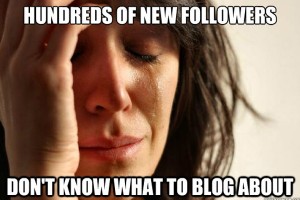 I hear you. You’re feeling a little like the cat. I mean, you’re cool with this blogging thing now, but you’re wondering what to write about. And even more, you’re wondering what I’m wanting you write about so you get the “grade”. I’m going to try to ease your pain now, but there still may be some leftover discomfort until you get well into this course and realize I’m serious about this course being different. So in this post, I’m going to describe some kinds of writing and the types of blog posts I’m thinking you’ll do. Then I’ll finish with a few tips about where and how to find inspiration and how I’m hoping this course will be different.
I hear you. You’re feeling a little like the cat. I mean, you’re cool with this blogging thing now, but you’re wondering what to write about. And even more, you’re wondering what I’m wanting you write about so you get the “grade”. I’m going to try to ease your pain now, but there still may be some leftover discomfort until you get well into this course and realize I’m serious about this course being different. So in this post, I’m going to describe some kinds of writing and the types of blog posts I’m thinking you’ll do. Then I’ll finish with a few tips about where and how to find inspiration and how I’m hoping this course will be different.
What kinds of writing?
I like to think that there’s a variety of types of writing. They run a long a spectrum and you’ve most likely done the writing at both ends. At one end is what I call academic writing. That’s what you’ve done for years in school. It’s all those essays, research papers, lab reports, term papers, and, yes, even those 1-3 paragraph things you post on some Desire2Learn forum in response to your professor’s “prompt”. Academic writing tends to be formal. It tends to be dry. It’s primarily you responding to some topic or prompt or trigger or question your professor posed. You’ve got limited ability to talk about what you want to talk about (yes, I know every professor says “write about what interests you as long it’s about this topic” — how’s that supposed to work?). What’s more, the writing assignment is disposable. Professor assigns. You write. Professor reads (yes, we do read them). Professor grades. End of life for the written piece. I’m right with the cat for academic writing. It produces anxiety because it’s likely being graded – grammar and spelling count! You’re expected to write drafts and then re-write. You’re expected to adopt a persona or voice. And don’t get me started on footnotes. I don’t know about you, but academic writing tends to really give me writer’s block.
At the other end of our writing spectrum is stuff most of you do everyday – those short, often grammatically incorrect or funny status updates on Facebook, or those text messages or Tweets or your latest Pinterest postings. What’s key about this writing is that it’s both inspired and shared. Let’s call it social writing since we tend to use social media for it. You see something on the Web that reminds you of something your friend said yesterday. So you post/share that thing on Facebook or Twitter or Snapchat or Pinterest or wherever. Social writing also reveals more of the “real you” and less of an adopted persona. Social writing is fun because it’s inspired (I said inspired, not always profound). You share it. It becomes part of a conversation and relationship you have with others.
So what about your blog? The nice thing about blogging is that it can fit in anywhere on this spectrum. For example, when I write on my econproph.com blog, I tend towards the more academic end, but it’s still more informal than if I was writing a research paper. At the other end, I use Facebook (sorry, I don’t FB with current students), Twitter (@econproph), and my other blog jimluke.com where I’m less formal and more social. But the best part of a blog in my opinion is that middle ground where you can have fun, use first person, let the real you show. Grammar and spelling are important because they help people read and understand (bad grammar gets in the way of reading). But grammar and spelling and academic “style” aren’t important per se.
I want you to experiment. Try different kinds of writing. Play around. If you see a funny meme or a picture that reminds you something sorta- kinda- related to what we’re all talking about here, then post it and share it. If you’re reading some book related to this course or you watch a TV show about some economy and you just have a strong reaction, share it. At the other end, I do expect at least a few posts from each of you this semester that are little towards the more serious, academic end. I’m interested in what you think, why, and what arguments you can make. I’m interested in what you’re learning, so tell me. And, I’m not the only one interested and reading what you say. Your fellow students are interested too. Let’s be social, have fun, but still have some interesting posts.
What types of posts? What formats?
Again, there’s a variety of ways to use a blog. Here’s an incomplete list of some of the things you can do and how you can format a post (in no particular order). You could write…
- essay posts. Essays tend to be longer than other posts. They could be topical as in “here’s what I think about some aspect of healthcare” or they can be self-reflective as in “as I did x I realized that y which I didn’t know before”. Topical essays can be explanatory such as “here’s how the healthcare system is funded in Lukistan”. Or they can be advocacy where you argue for a point of view such as “I’m opposed to such and such because x, y, and z”.
- quick comments. You read something in a book, or in somebody else’s blog (in the class or not), or you see some news item, or something on TV. You’re inspired to comment – the kind of comment you might make to somebody if they’re sitting next to you and share your interests. Tell us. Sure some of these will be short. But you’ll also find that by the time you explain or link to what triggered your comment (remember your reader doesn’t know till you tell them) and then explain your comment, you’ll have a nice little post.
- share memes. You see a meme (picture with caption like the cat above) on the Web or you made one. It’s funny or thought-provoking. Post it.
- share videos. Surf the web -especially Ted talks and the YouTubes. There’s a lot of videos of about topics related to comparative economic systems or some aspect of them. If you find one you found interesting or thought provoking, post it and offer a brief explanation of why you agree/disagree or like/don’t like it or how it relates to something else we’ve discussed.
- found other blog posts or articles and coment. This is actually one of the easiest things to do. You surf the web at economic type sites or blogs, or just the news. You find an article or news story. You can copy excerpts of what you’ve found, link to it, and explain your view or reaction or opinion. (please don’t copy the entire Web article and format the quoted part properly – it’s easy just highlight the quoted part you’ve pasted into the editor and then click the button with the quote-mark on it)
- a reaction or response to one of the posts your fellow students or I have made. I would love to see students doing this. Please remember to be civil and quote the other blog post properly.
- a review of a book or movie, including a summary of it. Actually, you’ll need to do this at least once for the book review assignment.
- an open letter to somebody, assuming it’s on a subject related to comparative economic systems. You don’t like how the government is handling some issue or you have a better idea for how the UN can reduce world poverty? Write a post as an open letter. It is in fact, open. This is your soapbox to the world.
I’m looking for you to try a variety of types of posts. You don’t “have to” do all of them, but I do suggest trying some different things. Find out what your own inner-blogger likes writing.
Where to find inspiration
Surf the web. Follow links. Go to the library. I’m serious. You probably don’t have a lot of courses where the professor tells you to just surf the web, but I’m telling you to surf. But by surfing the web I don’t mean endlessly clicking refresh on your Facebook page. I mean reading somebody else’s blog or news article and click and follow the links in it. Then follow the links in that page. Or find a YouTube video and then check out the suggestions for related-videos that YouTube makes.
In the coming days I’m going to create some posts with lists of other blogs and sites I follow regularly to get economic news and commentary. When I make those posts, they’ll also show up under the “Resources” tab on the home-page menu. In the meantime, I suggest you browse or search a few of these:
- My own econproph.com blog. I haven’t posted a lot in the past year, but I’ll be firing up again soon for this course. Try clicking on one of the categories or tags from the right and viewing the related posts.
- Paul Krugman’s blog at the New York Times at https://www.google.com/. Regardless of how you may feel about his politics, Paul is a consummate blogger and writer. It’s worth looking at just for style tips! But he’s also a really smart guy.
- The Angrybearblog.com. This is a group of commentators who offer their perspectives on economic news and events.
- At NakedCapitalism.com, you’ll find a lot of rather lengthy blog posts, many of them about international economic issues or the economic system here (often critical). You’ll also find a daily post listing all kinds of links to news stories and other commentary and the Antidote du Jour. It’s a great place to start surfing. The Antidote du Jour is Yves Smith’s daily picture of cute animals.
How we’re different in this course
 In most courses, the basic dynamic is
In most courses, the basic dynamic is
Professor tells students stuff > Professor tells students what he/she wants them to tell him/her back >Students tell the same stuff back to the Professor > Professor gives grade.
That’s not what’s gonna happen here. Picture this course as if we’re all seated in a big circle. We all go out and find and learn stuff about comparing economic systems. We share what we find. We comment and converse on it. And we all learn. Of course, I’ll do a lot of sharing. There will be some things that I will insist you read and then I’ll have short quiz questions (I’ll flag those posts!). But for the most part, you’re helping to co-teach this class along with everybody else.
As for the grading? Trust me. Just have some fun, write some stuff, share some stuff. The “grading” will work out just fine.